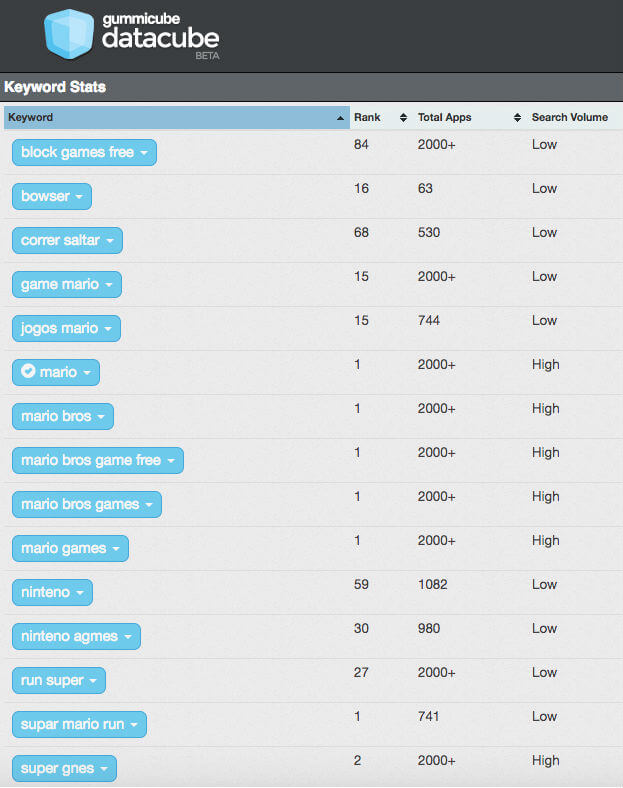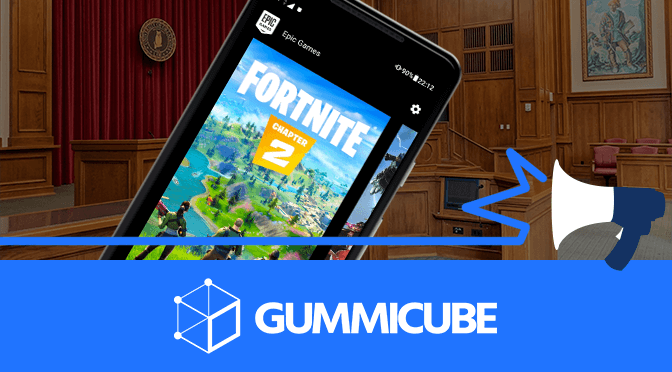Super Mario Run ASO Report Card
December 17th, 2016


by David Bell
CEO at Gummicube, Inc.
Like Pokémon GO before it, Super Mario Run hit the App Store hard when it launched on December 15th and quickly rose to number one on the Top Grossing charts. The game’s whirlwind success is certainly worth celebrating, and shows the enduring strength of Nintendo’s key properties. But in a market dominated by King and Supercell, will Nintendo have the savvy to keep Mario on top? That is the question we aim to answer with Super Mario Run’s first ASO report card. Nintendo is still new to the mobile market, after all, and they are facing off against companies that have had years of practice creating lasting brands in the App Store. Apple conferences and press tours have given Super Mario Run a fantastic start, but Nintendo also needs to consider the long tail profits of the app. With that in mind, it’s important to first examine the history of Nintendo products in the App Store. While Mario might be the most prolific of Nintendo’s characters to enter the App Store, he isn’t the first. Nintendo launched Miitomo in North America on March 31, and the app peaked at number one on the App Store’s Top Free Downloads chart. The app never got so high on the Top Grossing chart, topping out at just under 100 before falling back off. Today, the app does not place on either of the two charts. Perhaps a more immediate point of comparison, though, would be Pokémon GO. While not technically developed by Nintendo, the Pokémon brand is partially owned by the gaming giant, and Pikachu is considered one of Nintendo’s most recognizable mascots. The game also launched to a similar level of success as Super Mario Run, placing number one on both the Top Free Downloads and Top Grossing charts. It eventually went on to become the fastest mobile game to gross $600 million. But again, the initial success of the app was not necessarily indicative of long-term legs. Pokémon GO currently sits at number six on the Top Grossing charts (certainly not a bad position, but still a steep drop from number one) and number 50 on the Top Free Downloads chart. Keep in mind this is just after the launch of new collectable Pokémon, a time when the user base should be expanding. The quick success and sharp decline of Miitomo and Pokémon GO tell a story of big brands drawing mainstream attention, but a lack of long-term marketing coordination to keep those brands at the top. As we pointed out in a similar piece about Pokémon GO, these trends have a lot to do with the app’s keyword rankings. Pokémon, for example, failed to pick up rankings for feature-related keywords like “RPG, collect, catch, raise”, etc. It even missed out on rankings for famous Pokémon like Mewtwo and Charmander. Its rankings for more generic terms like “Pokémon game” and “mobile games” were strong, but ultimately it failed to reach out to a wider audience by neglecting feature-based keywords that users might be searching for. At this early stage, Super Mario Run looks to be following this trend closely. Take a look at a sample of its relatively limited rankings below.  Currently, the majority of Super Mario Run’s rankings revolve around the Mario franchise itself – See “Mario Games” and “Mario Bros” above. A few come from the company itself, like “Nintendo”. The app also ranks well for its major characters – “Mario” and “Luigi” are number one, and “Peach” is number 33. But when it comes to genre or feature terms, there are many highly-searched areas that Super Mario Run leaves on the table. The app is unranked for very popular, relevant terms like:
Currently, the majority of Super Mario Run’s rankings revolve around the Mario franchise itself – See “Mario Games” and “Mario Bros” above. A few come from the company itself, like “Nintendo”. The app also ranks well for its major characters – “Mario” and “Luigi” are number one, and “Peach” is number 33. But when it comes to genre or feature terms, there are many highly-searched areas that Super Mario Run leaves on the table. The app is unranked for very popular, relevant terms like:
Platformer
Runner
Running Game
Kingdom
Build
Collect
Multiplayer
The absence of rankings for Running-related terms is especially surprising given the “Run” in the game’s name. The app also fails to capitalize on its platforming gameplay, its asynchronous multiplayer mode, or its kingdom-building feature in its keyword bank. These are all popular search terms that would serve to expand the app’s search rankings and notify users of important features. If Super Mario Run continues with its current rankings, it’s not hard to see the app following a similar path as Pokémon GO or Miitomo. All three launched at a high point, but have limited rankings that fail to capitalize on all the app’s features. Super Mario Run in particular may drop farther on the Top Grossing charts than Pokémon because of its in-app purchase structure – Mario only has a one-time in-app purchase of $9.99 to unlock the full game. Ultimately, Super Mario Run fails to capitalize on its features and genre. A strong optimization could expand the app’s keywords to more relevant areas, ensuring that it maintains a high place on the charts and expands to an even wider audience.
Similar Articles

Posted on August 15th, 2020
Every time a user makes an in-app purchase or buys an app from the App Store or Play Store, Apple or Google takes a portion of the revenue. This App Store Tax has caused complaints for some developers, but with Apple and Google in the middle of antitrust hearings, tensions are continuing to grow.

Posted on August 8th, 2020
Apple has a strict set of App Store Guidelines that developers must follow in order to avoid being removed. Recently, it was announced that the guidelines will prevent developers from selling cloud gaming apps on the App Store. This could have an impact on app marketing, development and App Store Optimization.

Posted on July 7th, 2020
Apple Arcade, the App Store’s subscription game service, provides users with unlimited access to over 100 games for the price of $4.99 a month. Yet Apple can afford to be choosy, as it's cancelling several Arcade game contracts in the company’s effort to maintain subscribers.




 Currently, the majority of Super Mario Run’s rankings revolve around the Mario franchise itself – See “Mario Games” and “Mario Bros” above. A few come from the company itself, like “Nintendo”. The app also ranks well for its major characters – “Mario” and “Luigi” are number one, and “Peach” is number 33. But when it comes to genre or feature terms, there are many highly-searched areas that Super Mario Run leaves on the table. The app is unranked for very popular, relevant terms like:
Currently, the majority of Super Mario Run’s rankings revolve around the Mario franchise itself – See “Mario Games” and “Mario Bros” above. A few come from the company itself, like “Nintendo”. The app also ranks well for its major characters – “Mario” and “Luigi” are number one, and “Peach” is number 33. But when it comes to genre or feature terms, there are many highly-searched areas that Super Mario Run leaves on the table. The app is unranked for very popular, relevant terms like:
